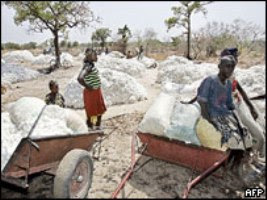This Day in 1960:
The Republic of Upper Volta (French: République de Haute-Volta) was established on December 11, 1958, as a self-governing colony within the French Community. The name Upper Volta indicated that the country contains the upper part of the Volta River. The river is divided into three parts, called the Black Volta, White Volta and Red Volta, and the colors of the national flag corresponded to the parts of the river.
The Republic of Upper Volta (French: République de Haute-Volta) was established on December 11, 1958, as a self-governing colony within the French Community. The name Upper Volta indicated that the country contains the upper part of the Volta River. The river is divided into three parts, called the Black Volta, White Volta and Red Volta, and the colors of the national flag corresponded to the parts of the river.
 Before attaining autonomy it had been French Upper Volta and part of the French Union. On August 5, 1960, it attained full independence from France. Burkina Faso, which means “Land of Incorruptible (or Upright) People,” was adopted in 1984.
Before attaining autonomy it had been French Upper Volta and part of the French Union. On August 5, 1960, it attained full independence from France. Burkina Faso, which means “Land of Incorruptible (or Upright) People,” was adopted in 1984. One of such seemingly incorruptible (upright) people was Thomas Sankara, a Burkinabe revolutionary leader notable for his commitment to women's rights which led him to outlaw female genital mutilation, forced marriages and polygamy, while appointing females to high governmental positions and encouraging them to work outside the home and stay in school even if pregnant.
One of such seemingly incorruptible (upright) people was Thomas Sankara, a Burkinabe revolutionary leader notable for his commitment to women's rights which led him to outlaw female genital mutilation, forced marriages and polygamy, while appointing females to high governmental positions and encouraging them to work outside the home and stay in school even if pregnant. 
This Day in 2010:
A poor country even by West African standards, landlocked Burkina Faso has suffered from recurring droughts, matched in number only by the military coups it has endured, especially during the 1980s. Today the country is, as with most of West African countries, severely affected by famine caused by yet another regionwide drought.
 Burkina Faso has significant reserves of gold, but cotton production is the economic mainstay for many Burkinabes. The industry is vulnerable to changes in world prices.
Burkina Faso has significant reserves of gold, but cotton production is the economic mainstay for many Burkinabes. The industry is vulnerable to changes in world prices.
[Sources: various]

No comments:
Post a Comment